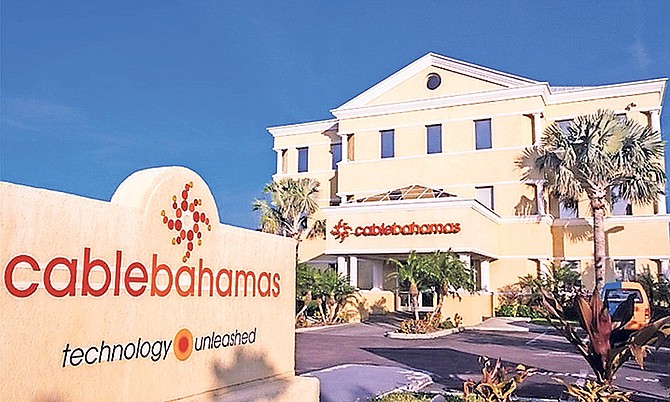By NEIL HARTNELL
Tribune Business Editor
nhartnell@tribunemedia.net
Regulators have slammed Cable Bahamas' explanation for replacing eight TV channels as "unconvincing", suggesting there were no licensing deals for their use "in the first place".
The Utilities Regulation and Competition Authority (URCA), unveiling the rationale for its decision to sanction the BISX-listed communications provider, said it believed the company's public statements on the matter were "not true or accurate".
These findings were unveiled by the communications regulator late last week following an investigation into Cable Bahamas' controversial decision to replace eight channels from its REV TV line-up - USA, Freeform, TV Land, Sprout, Nicktoons, Hallmark, Independent Film Channel and the Tennis Channel - on June 14, 2019.
URCA said it was only informed of the move, which impacted "a significant number" of pay-TV subscribers, one day before the switch, while customers found out about it on the same day even though one month's notice was supposed to be given. Responding to complaints via its Facebook page, Cable Bahamas said no provider could carry the Hallmark channel in The Bahamas and it "has to abide by the licensing agreements" with content distributors.
While sections of Cable Bahamas' response have been 'blacked out' in URCA's final ruling and order, the company said the replacement channels - ION TV, Escape TV, Heroes and Icons, PBS Kids, Qubo, ION Life, MOVIES! and Quest TV - were free-to-air content that could be picked up by its Bimini network and rebroadcast without the need for any licensing deals with the copyright holders.
However, referring to the company's public statements and explanation for the eight-channel switch, URCA said: "URCA disagrees with Cable Bahamas' explanation that when it attributed the channel removal to 'changes in licensing agreements' this meant there was a lack of any licensing agreements.....
"It is unclear to URCA how agreements which never existed in the first place can change. URCA finds Cable Bahamas' explanation to be unconvincing. URCA is still of the view that Cable Bahamas' public statements on the matter were not true or accurate." As a result, the regulator found the company in breach of the industry's consumer protection regulations.
URCA also dismissed Cable Bahamas' contention that it had not violated its own operating licence, the BISX-listed provider arguing that there had been no changes in the price per channel or package price for its offerings. Similarly, it said there had been no alteration to the terms and conditions of its TV service, while there was a website disclaimer noting that channel line-ups were subject to change.
URCA, though, concluded that channel line-ups "go to the very essence of the contract by defining the product sold to the subscriber". It added: "It cannot be dismissed as not forming part of the terms and conditions under the guise of the parole evidence rule to displace Cable Bahamas' obligation to give requisite notice."
To prove that customers had not suffered a "material detriment" to their welfare and enjoyment, Cable Bahamas also produced survey data showing that the number of visits and viewing hours for the eight new channels in July was higher than the May figures for the ones it had replaced.
Again rejecting this argument, URCA added: "Customers were at a disadvantage once the channels were removed and should have had an opportunity to decide if they wanted to unsubscribe from a service or package. To date, URCA has received 11 official complaints on the channel changes." Customer feedback on Cable Bahamas' Facebook page expressed similar sentiments.
The regulator, agreed to adjust the "starting point" for the fine to be levied on Cable Bahamas to 1 percent of its total June revenues derived from the PRIME, PRIME Extra and PRIME Sports packages given that just 1 percent and 2 percent of channels in the former two packages, respectively, were impacted.
However, this was ultimately increased to 1.25 percent of June revenues due to what URCA described as "the gravity of the breach" and "extenuating circumstances" related to the fact Cable Bahamas was "not truthful and accurate in its public statements" and was "not transparent in its communications" with the regulator.
"Cable Bahamas argued that very few of its customers were affected by the channel changes with less than 5 percent of viewing hours and less than 1 percent of views spent on the removed channels when compared to all of Cable Bahamas' programming," URCA added.
"Cable Bahamas reiterated that its reference of 'changes in licensing arrangements' did not refer to changes in terms of any licensing agreements but to the lack of such arrangements. Cable Bahamas reiterated that it complied with its legal obligations and that URCA misunderstood the technical arrangements and legal background for the new channels, which are free-to-air, and is expecting information that does not exist."
This was rejected by URCA, which found that the BISX-listed company breached both its operating licence, and the Bahamian communications industry's communications retail pricing rules as well as consumer protection regulations.
Cable Bahamas has also been ordered to compensate customers with a bill credit. Subscribers to Prime would receive $4, Prime Extra $6 and Prime Sports $2. Each credit is cumulative.
Franklyn Butler, Cable Bahamas' chief executive, did respond to a Tribune Business message seeking comment. Nor were messages to other Cable Bahamas executives responded to before press time.





Comments
Use the comment form below to begin a discussion about this content.
Sign in to comment
OpenID